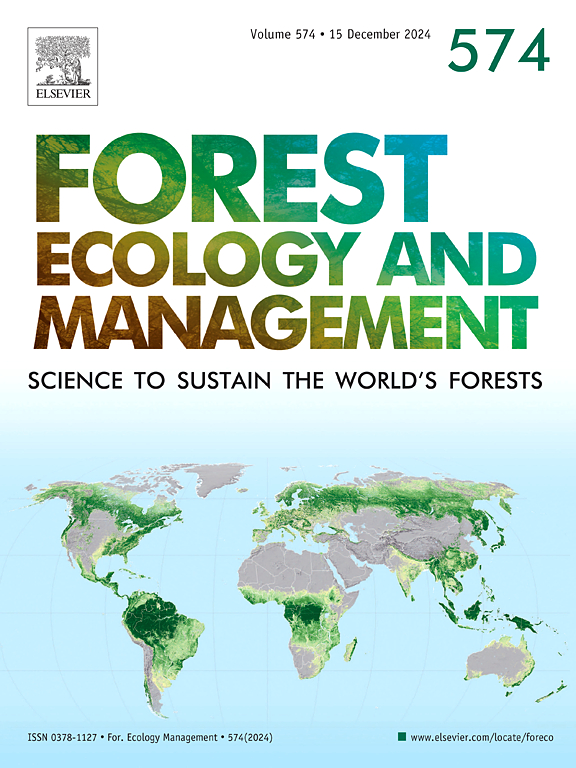Social information can alter the effect of habitat fragmentation on bird diversity and improve its stability
IF 3.7
2区 农林科学
Q1 FORESTRY
引用次数: 0
Abstract
Habitat loss and fragmentation are the primary drivers of biodiversity loss worldwide; however, their effects may be altered by both abiotic and biotic factors. Many animal species use social information, such as the presence of other individuals, while deciding where to settle; however, how the variability in social information alters the effects of habitat loss and fragmentation on biodiversity is unknown. Using a large-scale field experiment located in a Southern Poland, we demonstrated that adding attractive social information (the song of a passerine bird) increased taxonomic diversity and adding repulsive social information (voices of predators) decreased taxonomic diversity while increasing community stability. Furthermore, attractive social information altered the relationship between forest area and diversity, for example, by drastically increasing taxonomic diversity in small forest patches; this effect persisted even after one year of the experiment. Thus, social information may play a key role in shaping biodiversity and ecological laws (e.g. species-area relationships). Manipulation of social information may be an important conservation tool as it may increase taxonomic diversity in less utilised, yet suitable habitats, thereby reducing the negative effects of habitat fragmentation.
社会信息可以改变生境破碎化对鸟类多样性的影响,提高其稳定性
生境丧失和破碎化是全球生物多样性丧失的主要驱动因素;然而,它们的作用可能受到生物和非生物因素的影响。许多动物物种利用社会信息,比如其他个体的存在,来决定在哪里定居;然而,社会信息的可变性如何改变生境丧失和破碎化对生物多样性的影响尚不清楚。通过位于波兰南部的大规模野外实验,我们证明了添加有吸引力的社会信息(雀鸟的鸣叫)增加了分类多样性,添加排斥的社会信息(捕食者的声音)减少了分类多样性,同时增加了群落的稳定性。此外,有吸引力的社会信息改变了森林面积与多样性之间的关系,例如,通过大幅增加小森林斑块的分类多样性;这种效果甚至在实验一年后仍然存在。因此,社会信息可能在形成生物多样性和生态规律(例如物种-区域关系)方面发挥关键作用。社会信息的操纵可能是一种重要的保护工具,因为它可以增加较少利用但合适的栖息地的分类多样性,从而减少栖息地碎片化的负面影响。
本文章由计算机程序翻译,如有差异,请以英文原文为准。
求助全文
约1分钟内获得全文
求助全文
来源期刊

Forest Ecology and Management
农林科学-林学
CiteScore
7.50
自引率
10.80%
发文量
665
审稿时长
39 days
期刊介绍:
Forest Ecology and Management publishes scientific articles linking forest ecology with forest management, focusing on the application of biological, ecological and social knowledge to the management and conservation of plantations and natural forests. The scope of the journal includes all forest ecosystems of the world.
A peer-review process ensures the quality and international interest of the manuscripts accepted for publication. The journal encourages communication between scientists in disparate fields who share a common interest in ecology and forest management, bridging the gap between research workers and forest managers.
We encourage submission of papers that will have the strongest interest and value to the Journal''s international readership. Some key features of papers with strong interest include:
1. Clear connections between the ecology and management of forests;
2. Novel ideas or approaches to important challenges in forest ecology and management;
3. Studies that address a population of interest beyond the scale of single research sites, Three key points in the design of forest experiments, Forest Ecology and Management 255 (2008) 2022-2023);
4. Review Articles on timely, important topics. Authors are welcome to contact one of the editors to discuss the suitability of a potential review manuscript.
The Journal encourages proposals for special issues examining important areas of forest ecology and management. Potential guest editors should contact any of the Editors to begin discussions about topics, potential papers, and other details.
 求助内容:
求助内容: 应助结果提醒方式:
应助结果提醒方式:


